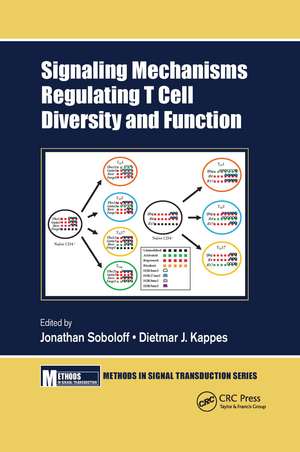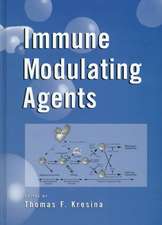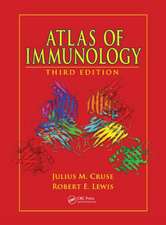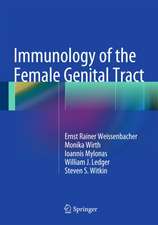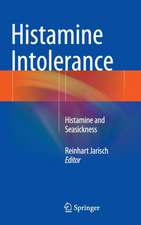Signaling Mechanisms Regulating T Cell Diversity and Function: Methods in Signal Transduction Series
Editat de Jonathan Soboloff, Dietmar J. Kappesen Limba Engleză Paperback – 30 mar 2021
| Toate formatele și edițiile | Preț | Express |
|---|---|---|
| Paperback (1) | 314.33 lei 43-57 zile | |
| CRC Press – 30 mar 2021 | 314.33 lei 43-57 zile | |
| Hardback (1) | 628.70 lei 43-57 zile | |
| CRC Press – 9 mar 2017 | 628.70 lei 43-57 zile |
Din seria Methods in Signal Transduction Series
- 5%
 Preț: 411.23 lei
Preț: 411.23 lei - 9%
 Preț: 638.43 lei
Preț: 638.43 lei -
 Preț: 434.25 lei
Preț: 434.25 lei - 12%
 Preț: 314.59 lei
Preț: 314.59 lei - 22%
 Preț: 433.34 lei
Preț: 433.34 lei - 11%
 Preț: 320.88 lei
Preț: 320.88 lei - 18%
 Preț: 783.87 lei
Preț: 783.87 lei - 5%
 Preț: 372.38 lei
Preț: 372.38 lei - 5%
 Preț: 413.05 lei
Preț: 413.05 lei - 12%
 Preț: 317.18 lei
Preț: 317.18 lei - 23%
 Preț: 311.60 lei
Preț: 311.60 lei - 28%
 Preț: 427.84 lei
Preț: 427.84 lei - 18%
 Preț: 899.96 lei
Preț: 899.96 lei - 15%
 Preț: 578.10 lei
Preț: 578.10 lei - 9%
 Preț: 1004.83 lei
Preț: 1004.83 lei -
 Preț: 435.98 lei
Preț: 435.98 lei - 26%
 Preț: 1298.81 lei
Preț: 1298.81 lei - 22%
 Preț: 358.03 lei
Preț: 358.03 lei - 25%
 Preț: 823.88 lei
Preț: 823.88 lei - 26%
 Preț: 1016.77 lei
Preț: 1016.77 lei
Preț: 314.33 lei
Preț vechi: 357.59 lei
-12% Nou
Puncte Express: 471
Preț estimativ în valută:
60.15€ • 62.96$ • 50.06£
60.15€ • 62.96$ • 50.06£
Carte tipărită la comandă
Livrare economică 31 martie-14 aprilie
Preluare comenzi: 021 569.72.76
Specificații
ISBN-13: 9780367658120
ISBN-10: 0367658127
Pagini: 274
Dimensiuni: 156 x 234 mm
Greutate: 0.54 kg
Ediția:1
Editura: CRC Press
Colecția CRC Press
Seria Methods in Signal Transduction Series
ISBN-10: 0367658127
Pagini: 274
Dimensiuni: 156 x 234 mm
Greutate: 0.54 kg
Ediția:1
Editura: CRC Press
Colecția CRC Press
Seria Methods in Signal Transduction Series
Cuprins
T cell origins, interactions and roles in adaptive immunity. Mechanisms regulating progression through DN stages. Positive selection. Negative selection. ThPok in cd4/cd8 selection. Directing cells into Gamma/Delta variants. Tregs. iNKT. Early events in T cell receptor engagement. T cell engagement and the Immunological Synapse. Orai1-mediated Ca2+ entry and T cell activation. Transcriptional mechanisms modulating Ca2+ signals during T cell activation. IFNs and Differentiation to Th1 cells.
Notă biografică
Jonathan Soboloff is a Professor in the Fels Institute for Cancer Research and Molecular Biology at Temple University in Philadelphia, Pennsylvania. He received his BS from University of Waterloo, Waterloo, Canada, in 1992, and his PhD from the University of Ottawa in 1998. He was a postdoctoral fellow in the Departments of Immunology (1998 to 2002) and Pathobiology & Laboratory Medicine (2002 to 2004) at the University of Toronto and a Research Associate in the Department of Biochemistry, University of Maryland 2004 to 2007. In 2007, he became an Assistant Professor in the Department of Biochemistry at Temple University. He was promoted to Associate Professor with tenure in 2013. In 2015, he transferred his primary affiliation to his current position at the Fels Institute. Finally, in 2017, he was promoted to the rank of Full Professor with Tenure. Dr. Soboloff’s research interests focus primarily on understanding STIM-mediated Ca2+ signaling, particularly in the context of T cell development and activation. Dr. Soboloff’s contributions include many fundamental insights into the roles of STIM and Orai in store-operated Ca2+ signaling and defining alternative roles for STIM1 particularly in the context of T cell activation. Understanding how Ca2+ signals are translated into physiological and pathophysiological responses is a special interest of the lab which has also led to contributions in the areas of melanoma and bone physiology. Dr. Soboloff has completed over 60 publications and is an editorial board member of The Journal of Cellular Physiology, Cell Calcium and Clinical Sciences.
Dietmar Kappes, Ph.D, is a professor and director of the Fox Chase Cancer Center in Philadelphia, Pennsylvania, USA.
Dietmar Kappes, Ph.D, is a professor and director of the Fox Chase Cancer Center in Philadelphia, Pennsylvania, USA.
Descriere
T cells play a vital role mediating adaptive immunity, a specific acquired resistance to an infectious agent produced by the introduction of an antigen. There are a variety of T cell types with different functions. They are called T cells, because they are derived from the thymus gland. This volume discusses how T cells are regulated through the
